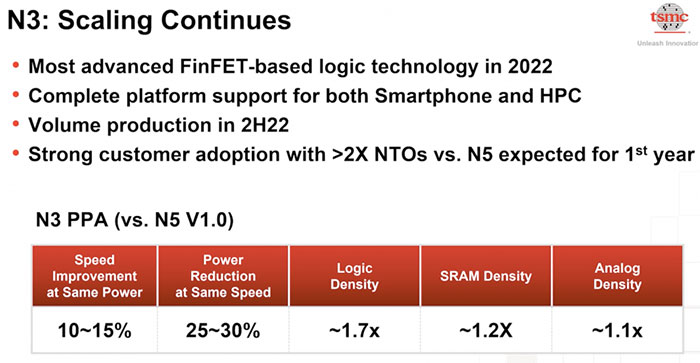TSMC’s most advanced process used for consumer tech is its 5nm node. Currently, the likes of Apple and Qualcomm seem to be hogging 5nm output, and we haven’t seen any TSMC 5nm output funnelled to consumer products in the PC industry as yet (unless you count the Apple M1 processor). Until recently, you might have comfortably bet on AMD and Nvidia being among the first PC component makers in the queue for new and advanced TSMC processes, but “several sources” have revealed to Nikkei Asia that Intel will beat them both as “first adopters” of TSMC 3nm.
The Nikkei report says that Intel and Apple currently have processor designs in testing, being prepared for TSMC 3nm production technology. It won’t be until H2 next year until these designs hit “commercial output” levels, though, at the earliest.
Intel’s first major order from TSMC in the wake of the IDM 2.0 announcement is interesting enough, but the story is made somewhat more exciting by an insider stating that “currently the chip volume planned for Intel is more than that for Apple’s iPad using the 3-nanometer process”.
What most PC enthusiasts will want to know is what client PC-centric parts Intel is going to get made by TSMC at 3nm. It would be natural to hope that PC desktop and laptop processors, as well as Xe-HPG GPUs, will be among the processors to benefit from this advanced process, but for all we know, the output could be focussed on server / automotive / AI / neural / quantum processors.
As a reminder of the trumpeted advantages of TSMC 3nm vs the current 5nm tech; it is supposed to provide performance uplifts of between 10 and 15 per cent, while reducing power consumption by 25 to 30 per cent. Chip designers will also be implementing their latest designs and optimisations.
Between now and when the first processors made on TSMC 3nm emerge, we will see 4nm chips. The next gen Apple iPhones, next year, will use 4nm “for scheduling reasons,” reports Nikkei Asia. This weekend, smartphone leaker Ice Universe tweeted that “Snapdragon 895 → Samsung 4nm. Snapdragon 895+ → TSMC 4nm”.
Intel confirmed to Nikkei Asia that it is working with TSMC on its 2023 product lineup.
AMD’s next gen Zen 4 processors will be TSMC 5nm products and are expected to debut in early 2022 according to the latest roadmaps. Meanwhile, its RDNA3 GPUs, emerging in a similar timescale, will use an as yet unannounced “advanced node”.






